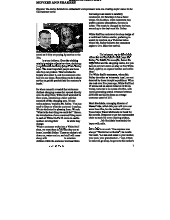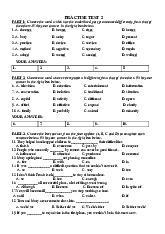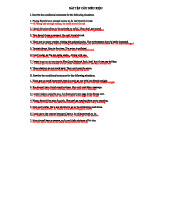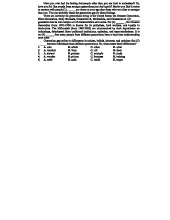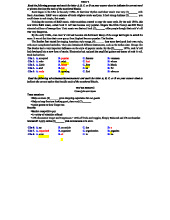





Preview text:
101 cấu trúc To V và Ving thường gặp nhất
1. Các động từ theo sau là "To V"
a. Công thức: S + V + to V
Afford : đủ khả năng Appear : xuất hiện Fail : thất bại Arrange : sắp xếp Bear : chịu đựng Begin : bắt đầu Choose : lựa chọn Promise : hứa
Decide : quyết định Expect : mong đợi Wish: ước Refuse : từ chối Learn : học hỏi Hesitate : do dự
Intend : dự định Prepare : chuẩn bị Manage : thành công Neglec t: thờ ơ
Propose : đề xuất Offer : đề nghị Pretend : giả vờ Seem : dường như Swear : thề Want : muốn
b. Công thức: S + V + O + to V Advise : khuyên Ask : hỏi Encourage : động viên Forbit/ban : cấm
Permit : cho phép Remind : nhắc nhở
Al ow : cho phép Expect : mong đợi Invite : mời Need : cần Order : ra lệnh Persuade : thuyết phục
Request : yêu cầu Want : muốn Wish : ước Instruct : hướng dẫn Mean : nghĩa là
Force : ép buộc Teach : dạy Tempt : xúi giục Warn : báo trước
Urge : thúc giục Tel : bảo Recommend : khuyên Require : đòi hỏi Inplore : yêu cầu Hire : thuê Direct : hướng dẫn, chỉ huy Desire : ao ước, Compel: cưỡng bách, thèm thuồng Dare : dám Convince: thuyết phục bắt buộc
Choose : lựa chọn Charge : giao Chal enge : nhiệm vụ thách thức Cause : gây ra Beg : van xin Appoint : bổ nhiệm
2. Những động từ theo sau là "V-ing" Anticipate : tham gia Avoid : tránh Delay : trì hoãn Postpone : Trì hoãn Quit : bỏ
Admit: chấp nhận Discuss : thảo luận Mention : đề cập Suggest : gợi ý Urge : thúc giục Keep : giữ Practice : thực hành
Continue : tiếp tục Involve : bap gồm Enjoy : thích Love : yêu
Dislike : không Mind : quan tâm Tolerate : cho Resist : chống cự thích phép Hate : ghét Resent : gửi lại
Understand : hiểu Imagine : tưởng tượng Recal m: nhắc Consider : cân nhắc Deny : từ chối
Ngoài ra những cụm từ sau cũng theo sau là V-ing: - It's no use/ It's no good - There's no point (in)....... - It's (not) worth..... - Have difficult (in)...
- It's a waste of time/money...... - Spend/waste time/money.... - Be/get use to. ... .. - Be/get accustomed to..... - Do/Would you mind..? - Be busy doing something...
- What about ...? How about.. ?
3. Những động từ theo sau gồm cả "To V" và "V-ing" Advise Attempt Commence Begin Al ow Cease Continue Dread Forget Hate Intend Leave Like Love Mean Permit Prefer Propose Regret Remember Start Study Try Can't bear Recommend Need Want Require Stop Trong đó:
Stop V-ing: Dừng làm gì (dừng hẳn) / Stop to V: dừng lại để làm việc gì
Remember / forget / regret to V : nhớ/quên/ tiếc sẽ làm gì (ở hiện tại - tương lai)
Remember / forget / regret V-ing: nhớ/quên/tiếc đã làm gì (ở quá khứ)
Try to V: cố gắng làm gì / Try V-ing : thử làm gì
Like Ving: thíc làm gì vì nó thú vị, hay, cuốn hút, làm để thưởng thức / Like to
do: làm việc đó vì nó là tốt và cần thiết
Prefer Ving to Ving : thích làm gì hơn làm gì / Prefer + to v + rather than (V): thích làm gì hơn làm gì
Mean to V: có ý định làm gì / Mean Ving: có nghĩa là gì
Need to V: cần làm gì / Need Ving: cần được làm gì (= Need to be done)
Used to V: đã từng/thường làm gì trong quá khứ (bây giờ không làm nữa)
Be/get used to Ving : quen với việc gì (ở hiện tại)
Advise/ al ow/ permit/ recommend + O + to V : khuyên/ cho phép/ đề nghị ai làm gì.
Advise/ Al ow/ permit/ recommend + Ving : khuyên/ cho phép/ đề nghị làm gì
See/ hear/ smel / feel/ notice/ watch + O + Ving: cấu trúc này được sử dụng
khi người nói chỉ chứng kiến 1 phần của hành động
See/ hear/ smel / Feel/ Notice/ Watch + O + V: cấu trúc này được sử dụng khi
người nói chứng kiến toàn bộ hành động * Tip chọn Ving - To V:
- Dùng V-ing với hành động kéo dài, To V với hành động ngắn
- Khi những động từ này ở bất kì thì tiếp diễn nào, ta không thể dùng V-ing
- Với những động từ chỉ suy nghĩ, hiểu biết ta phải dùng " To V": think,
understand, remember, fofget, realize, recognize, appreciate, comprehend, know..
- Với những từ chỉ tình cảm, cảm xúc ta không dùng "Ving" : love, hate, miss,
admire, respect, adore, feel, hear, see, smel , taste....
- Sau động từ khiếm khuyết (Modal verbs) + V nguyên mẫu : can, could, may,
might, must, shal , should, wil , would .....
- Nếu động tự thứ hai diễn ra sau động từ thứ nhất thì động từ thứ hai là "to V"
- Nếu động từ thứ hai diễn ra trước từ thứ nhất thì động từ thứ hai là "Ving" 4. Bài tập áp dụng:
I. Chia động từ trong ngoặc
1. I can't imagine Peter________ (go) by bike.
2. He agree_________ (buy) a new car.
3. The question is easy________ (answer)
4. The man asked me how_________(get) to the airport
5. I look forward to _______ (see) you at the weekend.
6. Are you thinking ò______ (visit) London?
7. We decide_________ (run) through the forest
8. The teache expected Sarah _______ (study) hard.
9. She doesn't mind _______ (work) the night shift.
10. I leaned____ (ride) the bike at the age of 5.
II. Put the verb into the correct form to infinitive or Gerund
1. When I'm tired, I ẹnoy __________ TV. It's relaxing (watch)
2. It was a nice day, so we decided __________ for a walk. (go)
3. It's a nice day. Does anyone fancy__________ for a walk? (go)
4. I'm not in a hurry. I don't mind ___________ (wait).
5. They don't have much money. They can't afford ______ out very often. (go)
6. I wish that dog would stop__________. It's driving me mad. (bark)
7. Out neighbour threatened_________ the police if we didn't stop the noise. (cal )
8. We were hungry, so I suggest_________ dinner early. (have)
9. Hurry up! I don't want to risk_______ the rain. (miss)
10. I'm stil looking for a job, but I hope________ something soon. (find)
III. Complete the sentences with the gerund form of the verbs in parentheses.
1. She is good at (dance)..... .... ...
2. He is crazy about (sing)..... .... .
3. I don't like (play)......... card.
4. They are afraid of (swim) ... .... ... im the sea.
5. You should give up (smoke).... ... .... . IV. Mutiple choice
1. I dream about .... .... (build) a big house. A. To build B. Build C. Building
2. I learned.. ... (ride) the bike ay the age 15. A. To ride B. Riding C. Ride
3. She doesn't mind... ... (work) the night shift A. Working B. To work C. Work
4. The man asked me how..... (get) to the airport. A. To get B. Getting C. Get
5. I can't image Peter ..... ...(go) by bike A. To go B. going C. went
6. He agree.. .... ...(buy) a new car A. To buy B. Buying C. Buy
7. The question is easy .... . (answer). A. To answer B. answer C. Answering
8. I look forward to ..... ...(see) you at the weekend. A. See B. Seeing C. No see
9. The teacher expected.... .. Sarah (study) hard. A. To study B. Studying C. Study
10. I ẹnyoy...... ... (write) picture postcards. A. Writing B. To write C. Write V. Rewrite the sentences:
1. I like making crafts expecial y bracelet.
-> I ẹnoy________________________________
2. Minh doesn't like making models because it is very boring.
-> Minh detests___________________________________
3. My brother likes making pottery because it is a creative activity.
-> My brother is hooked___________________________________
4. Ngoc hates sitting at the computer for too long
-> Ngoc dislikes____________________________
5. We enjoy doing gardening because it is very relaxing
-> We are keen____________________
VI. Chia động từ trong ngoặc
1. We decided ___________(buy) a new car.
2. They've got some work________ (do).
3. Peter gave up________ (smoke).
4. He'd like______ (fly) an aeroplane.
5. I enjoy________(write) picture postcards.
6. Do you know what_________(do) if there's a fire in the shop?
7. Avoid______ (make) sil y mistakes.
8. My parents wanted me ______ (be) home at 11 o'clock
9. I dream about_________ (build) a bog house. 10. I'm hoping_____(see) Lisa. VII. Give the correct form.
1. The children prefer (watch) _________TV to (read) _______books,
2. The boys like (play)_______ games but hate (do)_______ lessons.
3. Would you like (go)_____ now or shal we wait til the end?
4. I can't find my favourite book. You (see)________ it?
5. We used (dream)_________of a televison set when we (be) _____smail .
6. Would you mind (show)_______ me how (seen)_________ an email?
7. He always (think)_____ about (go)______ swimming.
8. She dislikes (do)______ a lot of housework.
9. My children enjoy (read) books.
10. She looked forward to (see)______ you.
VIII. Chia động từ ở trong ngoặc
1. They are used to (prepare)_______new lessons.
2. By (work)______ day and night, he succceed in (finish) the job in time.
3. His doctor advised him (give)______ up (smoke)
4. Please stop (talk)____ . We wil stop (eat) lunch in ten minutes.
5. Stop (argue)_____ and start (work)_______
6. I like (think)________ careful y about things before (make) ______decision.
7. Ask him (come)_______ in. Don't keep him (stand) at the door.
8. Did you succeed in (solve) _________ the problem?
9. Don't forget (lock)______ the door before (go)_______ to bed.
10. Don't try (persuade)__________ me. Nothing can make me (change)_________ my mind.
11. Nam suggested________ (talk) the children to shool yesterday.
12. They decided_________(play) tennis with us last night.
13. Mary helped me________ (repair) this fan and _______ (clean) the house.
14. We offer ______ (make) a plan.
15. We required them _______(be) on time.
Document Outline
- 101 cấu trúc To V và Ving thường gặp nhất
- 1. Các động từ theo sau là "To V"
- 2. Những động từ theo sau là "V-ing"
- 3. Những động từ theo sau gồm cả "To V" và "V-ing"
- 4. Bài tập áp dụng:
